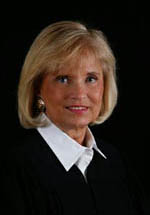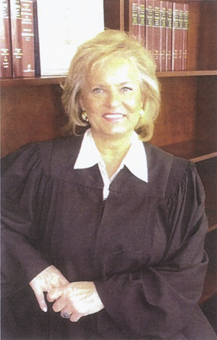Agosto 6, 2008
Por Pat Milhizer, Ley redactor Boletín
Aurelia Pucinski
Juez del Tribunal de Circuito del Condado de
Cook
Elegida:
2004
Hitos de su carrera:
Abogado de práctica privada, 1976-88; Corte de
Circuito del Condado de Cook secretario,
1988-2000; director, Illinois Departamento de
Regulación Profesional, agosto-diciembre de 2002
Facultad de Derecho:
DePaul University College of Law, 1975
Edad:
62
Intereses:
Jardinería, leer, cocinar, asistir a películas y
conciertos
Hace dos años, una anciana que estaba siendo agredida
por su hijo no se presentaron a una comparecencia
prevista ante Aurelia Pucinski para discutir el
estatus de una orden de emergencia de protección
civil.
"Mis notas indican que lo que se quejaba era que su
hijo adulto no la dejaba salir de la casa", dijo
Pucinski, un juez de circuito del Condado de Cook. "Y
entonces ella no volvió en la fecha de regreso."
Así Pucinski llamó al Departamento de Servicios de
Chicago, antiguamente conocido como el Departamento de
Envejecimiento. Un trabajador de la ciudad fue a la
casa de la mujer, acompañados por oficiales de
policía.
Cuando llegaron, encontraron que el hombre tenia
a su madre como rehén en su propia casa.
"Hubo mucha discusión acerca de si esta [llamada] era
apropiada o no .... Si yo no hubiera hecho esa llamada
original, creo que habría muerto ", dijo Pucinski.
Poco después de esa experiencia, Pucinski inició un
programa piloto para informar a la ciudad acerca de
los residentes de edad avanzada que el archivo de las
órdenes civiles de protección. El programa ha estado
funcionando durante un año.
"Lo pensé bien" Pucinski dijo. "¿Lo Qué tiene que
ocurrir es que los ciudadanos de mayor edad esten al
tanto de los servicios de la ciudad ... y que funciona
más allá de cualquier expectativa. Resultó ser un
proceso muy simple. No era una carga extra para mí o
para el personal. Se trataba de algo de fax, no una
gran cosa - la petición con la denuncia y la orden de
protección de emergencia.
"Y si el peticionario no regresa a la corte, el
departamento puede llamar para averiguar por qué",
dijo Pucinski.
Pucinski ha manejado cerca de 10.200 órdenes civiles
de protección. Y después de más de tres años de
esa llamada, ella comenzó una nueva
asignación, esta semana en la División del
Condado, la manipulación y las adopciones ilegales
relacionados con las elecciones, impuestos de
propiedad y la salud mental.
Ella
llama el cambio
"agridulce" porque, a pesar de que está lista para
intentar algo nuevo, que ella ayudó a iniciar el
programa de notificación.
"Me ha encantado
iniciar el programa piloto, pero
lo dejo en muy buenas manos", dijo.
La juez creció en el noroeste de la ciudad, la hija de
Roman Pucinski, un ex periodista, miembro de la Cámara
de Representantes de EE.UU. y el concejal de Chicago.
Su madre, también llamada Aurelia, dirigió la empresa
familiar, que era una estación de radio que los
programas de difusión en polaco, ucraniano, italiano,
alemán, ruso y español.
Con su padre viaj
ando
regularmente entre Chicago y Washington, DC, Pucinski
asisti
o a cinco escuelas
secundarias. Pero ella no le importaba.
"Pensé que era b
ueno. Me
encantó. La gente me mira ahora y dec
e, '¿Cómo has podido hacer eso? "Creo que nunca pensé
en no
gustarme. Era sólo la
forma en que iba a ser si me gustaba o no. Nunca se me
ocurrió que debería gemir y
quejarme, porque eso no iba a
cambiar ", dijo Pucinski.
Se graduó de la Universidad Católica de Washington en
1968 y regresó a enseñar en una escuela primaria en
Skokie. Ella comenzó a pensar en s
eguir los pasos de su padre a la escuela de derecho,
aunque nunca el mayor Pucinski tomó el examen de la
barra después de la graduación.
"Mi padre fue muy liberador. Él siempre me decía que
podía ser cualquier cosa que yo quería ", dijo
Pucinski.
Se graduó de la Universidad DePaul College of Law en
1975. Ese año, trabajó en un
a práctica de derecho
s
de familia en
un barrio del noroeste.
"Fue una muy buena manera de comenzar mi familia y
todavía tener una carrera", dijo Pucinski, quien tiene
tres hijos adultos.
En 1984, fue elegida a la junta que gobierna
el Distrito Sanitario
de la ciudad, ahora conocido como el Metropolitan
Water Reclamation District of Greater Chicago.
Cuatro años más tarde, se convirtió en la primera
mujer elegida como secretaria de circuito del condado
de Cook. Pasó 12 años en el cargo durante
el tiempo en que los avances
tecnológicos
permitieron
poner
computadoras en todas
las salas de audiencia.
Pucinski
fue candidata a juez
de
l circuito en 2004, y
ganó la carrera
al subcircuito. Dos años más
tarde, corrió
atraves del
condado y volvió a ganar.
Le gusta el reto intelectual presentad
o
servir en el banco
judicial - si
se trata de clasificar los hechos de un determinado
asunto o la determinación de lo que dice la ley.
"Estas personas tienen una crisis en su vida. El cien
por ciento de las personas que llegan al sistema
judicial tienen algún tipo de disfunción, "Pucinski
dijo. "Veo a todos los casos como un
rompecabezas
y ver, ¿cuál
es e
l caso
aquí?"
Pucinski no
veia demasiados
abogados en su
sala orden civil
de protección, pero eso no significa que su sala de
audiencias anteriores en 555 W. Harrison St. fu
era libre de argumentos.
"Hay un montón de argumentos, sobre todo si son
litigantes pro se," dijo Pucinski. "Pero no dej
o
que se vaya de la mano. Mi filosofía en esto ha sido
que la gente viene aquí, y probablemente necesi
tan
de
desahogarce un poco.
"Entonces el desafío es asegurarse de que no se salga
de las manos. Así que trato de darles su tiempo. Pero
dentro de
su limite. ",
dijo Pucinski.
No hubo acaloradas disputas durante la primera hora de
la llamada Pucinski una mañana la semana pasada. En
algunos casos, solamente un partido - el demandante o
demandado - se presentaron.
Una cuestión trata de un hombre joven y una mujer que
parecía no tener más de 18 años. El hombre había
solicitado y obtenido una orden de protección contra
la mujer, pero ella no pudo resistir a los
intentos de llegar a él a través
de mensajes de texto de teléfono celular.
En este caso, no hubo denuncias de violencia por
ninguna
partes. Pero Pucinski
se
ocupo de eso.
"Una de las cosas que pregunt
o
muy a menudo cuando el demandado es
ta
finalmente aquí," Pucinski dijo, "es" Do you love her?
¿Le quieres? "
Si dicen" Sí
". yo digo, 'Esto significa que
tu
respet
a a esta persona. ¿Cómo se
puede golpear a alguien que usted al respect
a? ¿Cómo es posible? "
"Creo que la gente, a veces sus relaciones son la
hilatura," Pucinski dijo. "Así que lo mejor que puedo
hacer es lograr que se calme ... y pregunta
r, '¿Quiere
n estar juntos? Si no
quieren estar juntos, entonces no est
en
juntos. Pero no est
en juntos y
ser chocando entre sí. Eso no va a trabajar. "Sobre
todo si hay niños involucrados."
Pero en el panorama general, los casos representan una
pequeña fracción de los aproximadamente 5,2 millones
de personas en el Condado de Cook.
"De ellos, el año pasado vimos 6.800 casos de orden
civil de protección. Hay más por ahí que son
declarados; eso lo entiendo. Pero si lo mantiene en
perspectiva, la gran mayoría de las personas que están
en relaciones están haciendo bien. O se está moviendo
sin ningún problema ", dijo Pucinski.
En otro caso, la semana pasada, un hombre estaba
teniendo problemas con una hijastra que le robó la
televisión y lo amenazó. El problema era que los
agentes del alguacil no pudieron encontrar a servir el
pedido.
Como era mayor de 60 años, el juez ya había tenido la
petición y la orden enviada por fax al Departamento de
Servicios para Ancianos de Chicago, que es práctica
común en estos casos.
A cambio, los controles en el departamento de los
ancianos residentes en el bienestar y ofrece comidas
gratis, los servicios de ama de casa y el transporte.
Durante su tiempo en el banco
judicial, nunca Pucinski oído a nadie quejarse de que la
ciudad no les llame.
"Ella va más allá", dijo Joyce Gallagher, comisionada
del Departamento de Servicios para Ancianos de
Chicago.
Pucinski también escribió un libro banco que contiene
un resumen de todas las formas y procedimientos
necesarios para manejar las órdenes civiles de
protección.
Y desarrolló una de las formas a sí misma.
Para los pedidos de emergencia, los peticionarios que
abandonar la sala ahora tienen un certificado de
declaración jurada de servicio que pueden utilizar
cuando llegue
n a casa. Antes de
llegar a casa, son instruidos para llamar a la policía
para hacerles saber que va
n a
casa con una orden para obtener el demandado fuera de
la casa.
Entonces la policía se presentan y garantizar que el
demandado
le sirv
an
con la orden.
"El demandado tiene que salir hasta que haya una
audiencia ... y esos son los casos difíciles, ya que
teóricamente tienen derecho a vivir a
hi", dijo Pucinski.
"Pero no es seguro para un solicitante de volver a
casa y tirar un esposo, novio o esposa de la casa.
¿Quieres que ella o él
vaya a
casa con la policía. Que la policía haga su trabajo ",
dijo Pucinski.
Cuando está en casa, Pucinski le gusta cocinar y
considera stroganoff y cazuela de maíz como los platos
que
sacan los máximo
s
cumplidos.
"Cuando se jubile, he pensado en ir a la escuela de
chef y convertirse en un
a
voluntari
a en un refugio o algún
lugar", dijo Pucinski.
Ella también piensa que su padre, quien murió en 2002,
habría estado orgulloso de una hija que ha trabajado
en las tres ramas del gobierno.
"Ha sido una experiencia fenomenal", dijo Pucinski.
"Cada pieza que encaja y me ayuda a ser mejor juez y
servir a esta comunidad de manera que siempre son
emocionantes e interesantes."
Reproducido con permiso de la Ley Boletín
Publishing Company.







